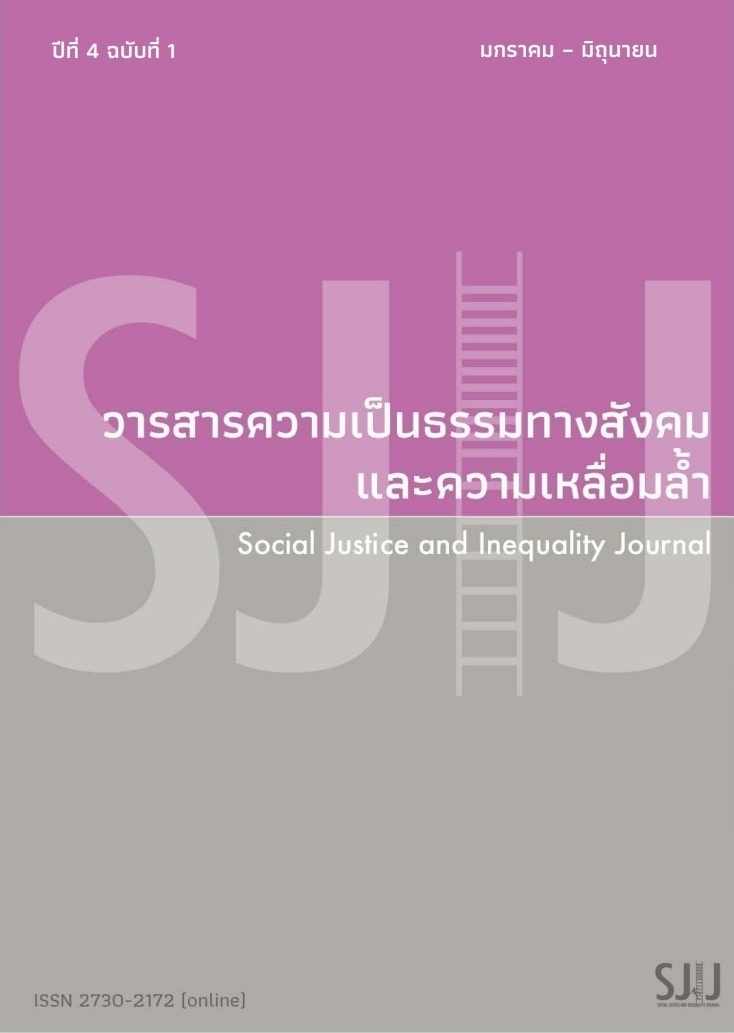Forum Theatre: possibility to just treatment through empathy
ละครแทรกสด: โอกาสของการปฏิบัติอย่างเป็นธรรมผ่านความเข้าอกเข้าใจ
Keywords:
empathy, empathy display, Forum TheatreAbstract
ละครแทรกสดอันมีรากฐานมาจากละครของผู้ถูกกดขี่เกิดขึ้นจากปณิธานที่จะลดความเหลื่อมล้ำระหว่างผู้มีอำนาจกับมวลชนในระดับรากหญ้า และมีกระบวนการที่อ้างอิงอยู่กับหลักการประชาธิปไตย โดยพื้นฐาน ละครแทรกสดให้คุณค่ากับการให้เหตุผล และการอยู่กับความเป็นจริง จึงพยายามแยกผู้ชมออกจากวังวนของอารมณ์ โดยเฉพาะอย่างยิ่งอารมณ์ที่ไม่นำไปสู่ปัญญาเพราะเป็นอุปสรรคต่อการเกิดจิตสำนึกเชิงวิพากษ์ และการลุกขึ้นมาปฏิบัติการ ซึ่งนับเป็นหลักการที่แตกต่างจากละครกระแสหลักที่สนับสนุนให้ผู้ชมดำดิ่งหรือกลืนหายไปในโลกของละคร อย่างไรก็ตามตัวอย่างจากละครแทรกสดเรื่อง “หนูเบื่อโรงเรียน” แสดงให้เห็นว่าผู้ชมและผู้แสดงมีความคิดเชิงวิพากษ์ในขณะที่ก็รับรู้สภาวะทางอารมณ์ของตนเอง
References
Bureau of Public Relation, UNESCO 2007. Theatre and Development. UNESCO information sheet.
Conte et al. 2001. Sociological and Social Theory in Agent Based Social Simulation: A Symposium. Computational & Mathematical Organization Theory. 7 (183-205).
Corsa, Andrew 2021. Empathy and Moral Education, Theatre of the Oppressed, and The Laramie Project. Journal of Moral Education. 50(2). 219–232. https://doi.org/10.1080/03057240.2019.1703658
Daly, Anya 2014. Primary Intersubjectivity: Empathy, Affective Reversibility, ‘Self-Affection’ and the Primordial ‘We’. Topoi. 33 (1). 227-241.
Gunkle, George 1963. Empathy: implications for theatre research. Educational Theatre Journal. 15 (1) . 15-23.
Rathje, Steve, Hackel, Leor and Zaki, Jamil 2021. Attending live theatre improves empathy, changes attitudes, and leads to pro-social behavior. Journal of Experimental Social Psychology. 95(2).104-138.
Gupta, Setu & Agrawal, Abhinav & Singh, Satendra & Singh, Navjeevan 2013. Theatre of the Oppressed in medical humanities education: the road less travelled. Indian journal of medical ethics. 10. 200-3. 10.20529/IJME.2013.059.
McCaffree, Kevin 2020. Towards an Integrative Sociological Theory of Empathy. European Journal of Social Theory 23(4) 550-570.
Psychiatric Medical Care Communications Team n.d. The Difference Between Empathy and Sympathy. https://www.psychmc.com/blogs/empathy-vs-sympathy
Ruiz-Junco, Natalia 2017. Advancing the Sociology of Empathy: A proposal. Symbolic Interaction. 40 (3). 414-435.
Salgado, M. and Gilbert, N. 2013. Emergence and Communication in Computational Sociology. J Theory Soc Behav, 43: 87-110. https://doi.org/10.1111/jtsb.12004
Barrett Scroggs, Sally Bailey and Bronwyn Fees 2016.The impact of participation in creative drama on empathy levels in emerging adulthood: a pilot study. Drama Therapy Review 2(2). http://dx.doi.org/10.1386/dtr.2.2.211_1
Sevrain-Goideau et al. 2020. Forum Theater Staging of Difficult Encounters with Patients to Increase Empathy in Students: evaluation of efficacy at The University of Angers Medical School. BMC Medical Education 20(58). https://doi.org/10.1186/s12909-020-1965-4
Vinci, Elisabetta 2019. Empathy in Modern Drama: Bertoltht’s Threepenny Opera. GESTALT THEORY. 41(2):159-172.
Walsh, Philip 2014. Empathy, Embodiment, and the Unity of Expression. Topoi. 33: 215-226.
Zahavi, Dan 2010. Empathy, Embodiment and Interpersonal Understanding: from Lipps to Schutz. Inquiry 53(3): 285-306.
Downloads
Published
Issue
Section
License
Copyright (c) 2023 Social Justice and Inequality Journal

This work is licensed under a Creative Commons Attribution-NonCommercial-ShareAlike 4.0 International License.




